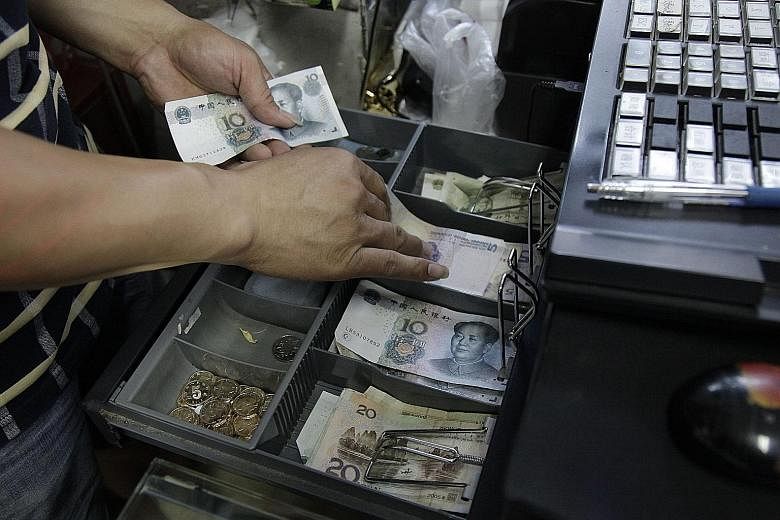While regional markets calmed down after the shock of the yuan devaluations last week, the longer-term impact is likely to be one of increased uncertainty among investors.
After the three rounds of devaluation last week, which sent the yuan down by 3 per cent, the People's Bank of China (PBOC) raised the rate last Friday in a bid to stabilise the currency - to send the message that it will intervene if market volatility becomes too excessive.
By the weekend, Asian markets had regained their composure after the scare over the yuan devaluations. The MSCI Asia Pacific (excluding Japan) index lost 2.7 per cent last week, but the Shanghai Composite was up 0.27 per cent last Friday.
Singapore's benchmark Straits Times Index (STI) also rose for the second straight day last Friday, up by 0.73 per cent to 3,114.25, trimming its five-day drop to 2.58 per cent.
"For now at least, the markets have absorbed the direct impact from PBOC's adjustments. But this event could be the black swan that will hold sentiments back just as investors are getting ready for a September (US) rate hike," CMC Markets analyst Nicholas Teo told The Straits Times.
Remisier Desmond Leong is also not optimistic: "Two weeks ago, the STI already went below the trend line... which is an indicator we use to track the market troughs.
"The two-day rebound was likely just technical and, with both China and Singapore showing weak economic figures, we may see the index testing the 3,000 level in the near term."
Earlier this month, China reported a surprise drop of 8.3 per cent in July exports - which many saw as a reason for the yuan devaluations. In Singapore, the Ministry of Trade and Industry narrowed the growth forecast for this year to 2 per cent to 2.5 per cent, down from the previous 2 per cent to 4 per cent range, to reflect the global headwinds.
Local investors have also found little to cheer about from the recent season of corporate results.
Among the sectors which are finding it tough, offshore and marine companies may still not yet have seen the worst of it, with the United States crude benchmark West Texas Intermediate plunging to a six-year low last week.
As oil prices show fresh signs of weakening, Ezion Holdings last Friday reported a 36.3 per cent decline in its second-quarter net profit to US$28.96 million (S$40.7 million). This followed a year-on-year profit decline reported by both Keppel Corp and Sembcorp Marine earlier.
All three stocks remain in a downward slide. Over the past month, shares of Keppel Corp lost 10 per cent, Sembcorp Marine dropped 7 per cent, and Ezion slid 23 per cent.
Blue-chip property developer City Developments (CDL) last Thursday also reported that its second-quarter profit dropped 3.2 per cent to $133.5 million. The announcement came after CDL's shares hit a new 52-week low last week at $8.80 as investors sold down on the persistent uncertainties surrounding the local property market.
"There are currently more than 6,122 private residential units that have been launched and unsold, and potentially 12,139 units that are yet to be launched in Singapore. We expect the excess supply of units in the market to continue," PhillipCapital said in a recent note.
The quarter ahead is offering few reasons for investors to be confident, CMC Markets' Mr Teo cautioned.
"The corporate earnings reported so far broadly showed that the bottom line remained healthy as a result of effective financial management, which is good to have.
"But top-line growth - actual business growth - has not picked up, and investors are apprehensive about that."


